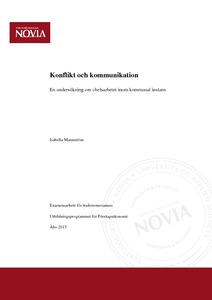Konflikt och kommunikation: En undersökning om chefsarbetet inom kommunal instans
Mannström, Isabella (2015)
Mannström, Isabella
Yrkeshögskolan Novia
2015
All rights reserved
Julkaisun pysyvä osoite on
https://urn.fi/URN:NBN:fi:amk-201505076522
https://urn.fi/URN:NBN:fi:amk-201505076522
Tiivistelmä
Abstrakt
Detta examensarbete handlar om hurdan syn chefer har på konflikter och hur konflik-ter hanteras i den undersökta organisationen. I undersökningen har jag även under-sökt hur kommunikationen fungerar mellan chef och medarbetare samt hurdan feed-backpolicy som finns.
Arbetet består av en teoretisk och en empirisk del. I teoridelen som är uppdelad i tre delar tas det först upp allmänt om ledarskap och om olika ledarstilar. I den andra delen går jag djupare in i de konflikter som uppstår på en arbetsplats samt den roll som chefen har i en konfliktsituation. Den sista delen handlar om kommunikationen mellan chef och medarbetare.
Min empiriska del består av en kvantitativ undersökning som jag utfört åt en kommu-nal instans, som har valt att hålla sig anonyma under hela arbetet. Målgruppen var personalen inom koncernens administration som handhar de strategiska ärenden. I undersökningen som utfördes den 9.3 - 20.3.2015 deltog totalt 97 respondenter.
Resultatet visar att flera respondenter var mycket missnöjda med den feedback som fås i organisation men även brister i informationsflödet finns. Resultatet var intressant men samtidigt oförväntat. Abstract
This thesis is about what kind of approach managers have on conflicts and how con-flicts are handled in the examined organization. In the survey I have also examined how the communication works between managers and employees and what kind of feedback policy exist.
The thesis consists of two parts, a theoretical and an empirical part. . The theoretical part is divided in three parts. The first part is generally about leadership and different leadership styles. The second part is more deeply about different conflicts that can occur on workplaces and the manager role in the conflict situation. The last part is about the communication between the manager and employees.
My empirical part consist of a quantitative survey that I conducted to a municipal in-stance, which has chosen to remain anonymous throughout the entire process. The target group was staff in the group’s management that handle strategic matters. The study were conducted 9.3-20.3.2015 and was answered by 97 respondents.
The result shows that several respondents were very dissatisfied with the feedback
The result was interesting but at the same time unexpected.
Detta examensarbete handlar om hurdan syn chefer har på konflikter och hur konflik-ter hanteras i den undersökta organisationen. I undersökningen har jag även under-sökt hur kommunikationen fungerar mellan chef och medarbetare samt hurdan feed-backpolicy som finns.
Arbetet består av en teoretisk och en empirisk del. I teoridelen som är uppdelad i tre delar tas det först upp allmänt om ledarskap och om olika ledarstilar. I den andra delen går jag djupare in i de konflikter som uppstår på en arbetsplats samt den roll som chefen har i en konfliktsituation. Den sista delen handlar om kommunikationen mellan chef och medarbetare.
Min empiriska del består av en kvantitativ undersökning som jag utfört åt en kommu-nal instans, som har valt att hålla sig anonyma under hela arbetet. Målgruppen var personalen inom koncernens administration som handhar de strategiska ärenden. I undersökningen som utfördes den 9.3 - 20.3.2015 deltog totalt 97 respondenter.
Resultatet visar att flera respondenter var mycket missnöjda med den feedback som fås i organisation men även brister i informationsflödet finns. Resultatet var intressant men samtidigt oförväntat.
This thesis is about what kind of approach managers have on conflicts and how con-flicts are handled in the examined organization. In the survey I have also examined how the communication works between managers and employees and what kind of feedback policy exist.
The thesis consists of two parts, a theoretical and an empirical part. . The theoretical part is divided in three parts. The first part is generally about leadership and different leadership styles. The second part is more deeply about different conflicts that can occur on workplaces and the manager role in the conflict situation. The last part is about the communication between the manager and employees.
My empirical part consist of a quantitative survey that I conducted to a municipal in-stance, which has chosen to remain anonymous throughout the entire process. The target group was staff in the group’s management that handle strategic matters. The study were conducted 9.3-20.3.2015 and was answered by 97 respondents.
The result shows that several respondents were very dissatisfied with the feedback
The result was interesting but at the same time unexpected.
